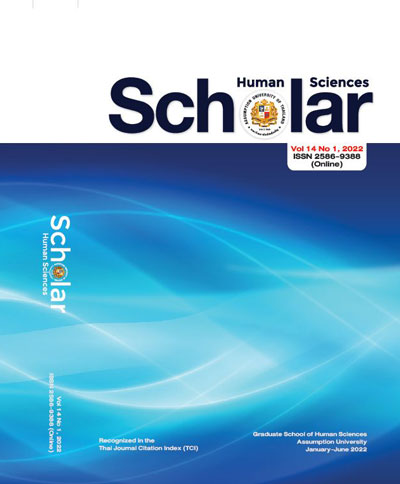THE RELATIONSHIP OF ENGLISH WRITING MOTIVATION AND SELF-EFFICACY WITH ENGLISH WRITING ACHIEVEMENT OF GRADE 11 STUDENTS AT A DEMONSTRATION SCHOOL IN BANGKOK, THAILAND
Keywords:
English writing motivation; English writing self-efficacy; English writing achievement; demonstration schoolAbstract
The aim of this study was to determine the relationship between the Grade 11 students’ English writing motivation and English writing self-efficacy with English writing achievement at a demonstration school in Bangkok, Thailand. The study used a quantitative correlational research design. For one of the instruments of this study, the English Writing Motivation and Self-Efficacy Questionnaire, the researcher adapted 30 items from Gardner’s (2010) Attitude/Motivation Test Battery (AMTB) and adopted 10 items from Wang, Kim, Bong and Ahn’s (2013) Questionnaire of English Self-Efficacy. The English Writing Motivation and Self-Efficacy Questionnaires was used to collect data on the Grade 11 students’ English writing motivation and English writing self-efficacy levels. The questionnaire was distributed to 64 Grade 11 students during February, 2020. The Grade 11 students’ in-school English Writing Examination was used to measure their English writing achievement. The in-school English Writing Examination was also distributed to the 64 Grade 11 students during March, 2020. Descriptive statistics (means and standard deviations) were used first to analyze the data. Multiple correlation coefficient analysis was then used to find the relationships among the Grade 11 students’ English writing motivation, English writing self-efficacy and English writing achievement. The findings showed that the Grade 11 students had a moderately high level of English writing motivation and a slightly high level of English writing self-efficacy. Furthermore, the findings indicated that there was a significant, moderately strong, positive relationship between English writing motivation and English writing achievement. English writing self-efficacy had a weak but positively significant relationship with English writing achievement. The findings also showed that English writing motivation had a moderately strong, significant, positive relationship with English writing self-efficacy. Finally, the findings revealed that there was a moderately strong, significant, positive relationship between English writing motivation and English writing self-efficacy with English writing achievement. Recommendations are provided for students’ support, teaching strategies and future research.
References
Adaros, A, E. (2017). The influence of self-regulation, motivation, proficiency, and gender on L2 first-year writing achievement (Unpublished doctoral dissertation). Temple University, Pennsylvania, United States.
Bandura, A. (1989). Social cognitive theory. In R. Vasta (Ed.), Annals of child development. Six theories of child development, (Vol.6, pp.1-60). Connecticut, United States: JAI Press.
Bandura, A. (1994). Self-efficacy. In V. S. Ramachandran (Ed.), Encyclopedia of human behavior (Vol. 4, pp. 71-81). New York, United States: Academic Press.
Darasawang, P. (2007). English language teaching and education in Thailand: A decade of change. In D. Prescott (Ed.), English in Southeast Asia: Varieties, literacies, and literatures (pp. 187-204). Newcastle, United Kingdom: Cambridge Scholars Publishing.
Education First. (2019). EF EPI: English proficiency index. Retrieved from https://www.ef.co.th/epi/regions/asia/thailand/
Gardner, R. C. (2010). Motivation and second language acquisition: The socio-educational model (Vol. 10). New York, United States: Peter Lang Publishing.
Kaur, A., Young, D., & Kirkpatrick, R. (2016). English education policy in Thailand: Why the poor results? In R. Kirkpatrick (Ed.), English language education policy in Asia (pp. 345-361). Cham, Switzerland: Springer International Publishing.
Kaur, J., & Khodadad, M. (2016). Causal relationships between integrative motivation, self-efficacy, strategy use, and English language achievement. The Southeast Asian Journal of English Language Studies, 22(3), 111-125.
Khosravi, M., Ghoorchaei, B., & Mofrad, A. (2017). The relationship between writing strategies, self-efficacy and writing ability: A case of Iranian EFL students. International Journal of English Language & Translation Studies, 5(3), 96-102.
Lo, J., & Hyland, F. (2007). Enhancing students’ engagement and motivation in writing: The case of primary students in Hong Kong. Journal of Second Language Writing, 16 (4), 219-237.
Magno, C. (2009). Self-regulation and approaches to learning in English composition writing. TESOL Journal,1(1), 1-16. Retrieved from https://www.researchgate.net/publication/228175957_Self-Regulation_and_Approaches_to_Learning_in_English_Composition_Writing
Mala, D. (2018, 5th November). Thai English proficiency drops. Bangkok Post. Retrieved from https://www.bangkokpost.com/ Thailand/general/1570042/Thai-English-proficiency-drops
Methitham, P., & Chamcharatsri, P. B. (2011). Critiquing ELT in Thailand: A reflection from history to practice. Journal of Humanities, 8(2), 57-68. Retrieved from http://www.human.nu.ac.th /jhnu/file/journal/2011_10_10_14_52_29.phongsakorn4.pdf
Pajares, F. (1996). Self-efficacy beliefs in academic settings. Review of Educational Research, 66(4), 543-578. Retrieved from https://www.uky.edu/~eushe2/Pajares/Pajares1996RER.pdf
Pajares, F. (2002). Self-efficacy beliefs in academic contexts: An outline. Retrieved from http://des.emory.edu/mfp/efftalk.html
Palaleo, P., & Srikrajang, J. (2018). English anxiety among Thai nursing students of Boromarajonani College of Nursing, Nakhon Lampang, Thailand. Asian Journal for Public Opinion Research, 5(3), 256-265.
Rodsawang, S. (2017). Writing problems of EFL learners in higher education: A case study of the Far Eastern University. FEU Academic Review, 11(1), 268-284.
Stone, G. (2017). Implementation of critical literacy for English writing classes in the Thai context. The New English Teacher, 11(2), 65-76.
Talerngsri, A. (2019, 20th November). Why English matters to Thailand. Bangkok Post. Retrieved from https://www.bangkokpost.com/ business/1798104/why-English-matters-to-Thailand
Teo, A., & Hetthong, R. (2013). Does writing self-efficacy correlate with and predict writing performance?. International Journal of Applied Linguistics & English Literature, 2(1), 157-167.
Trakulkasemsuk, W. (2018). English in Thailand: Looking back to the past, at present, and towards the future. Asian Englishes, 20(2), 96-105.
Wang, C., Kim, D., Bong, M., & Ahn, S. (2013). Examining measurement properties of an English Self-Efficacy scale for English language learners in Korea. International Journal of Education Research, 59(1), 24-34.
Downloads
Published
How to Cite
Issue
Section
License
The submitting author warrants that the submission is original and that she/he is the author of the submission together with the named co-authors; to the extend the submission incorporates text passages, figures, data, or other material from the work of others, the submitting author has obtained any necessary permission.
Articles in this journal are published under the Creative Commons Attribution License (CC-BY What does this mean?). This is to get more legal certainty about what readers can do with published articles, and thus a wider dissemination and archiving, which in turn makes publishing with this journal more valuable for you, the authors.




